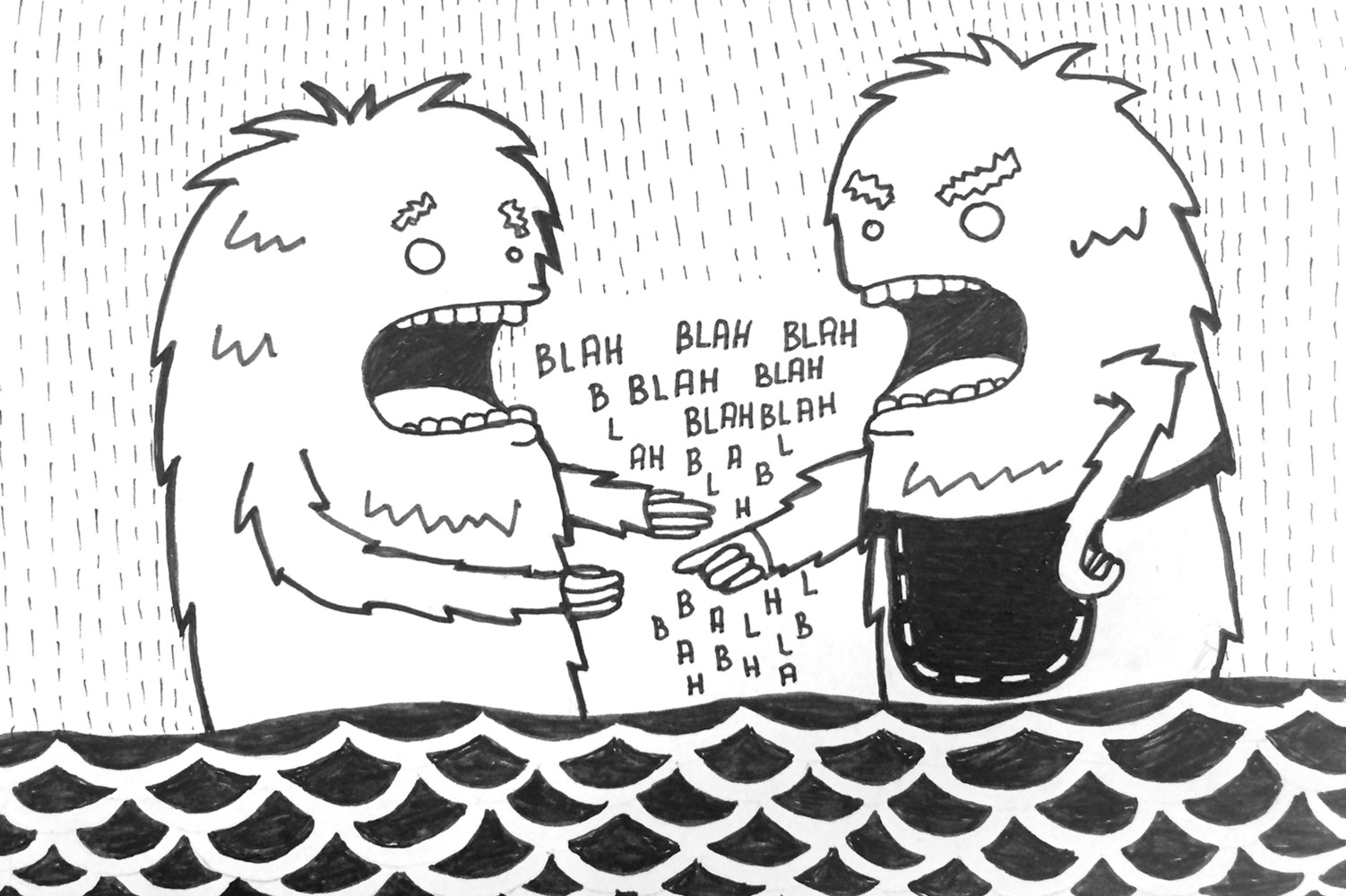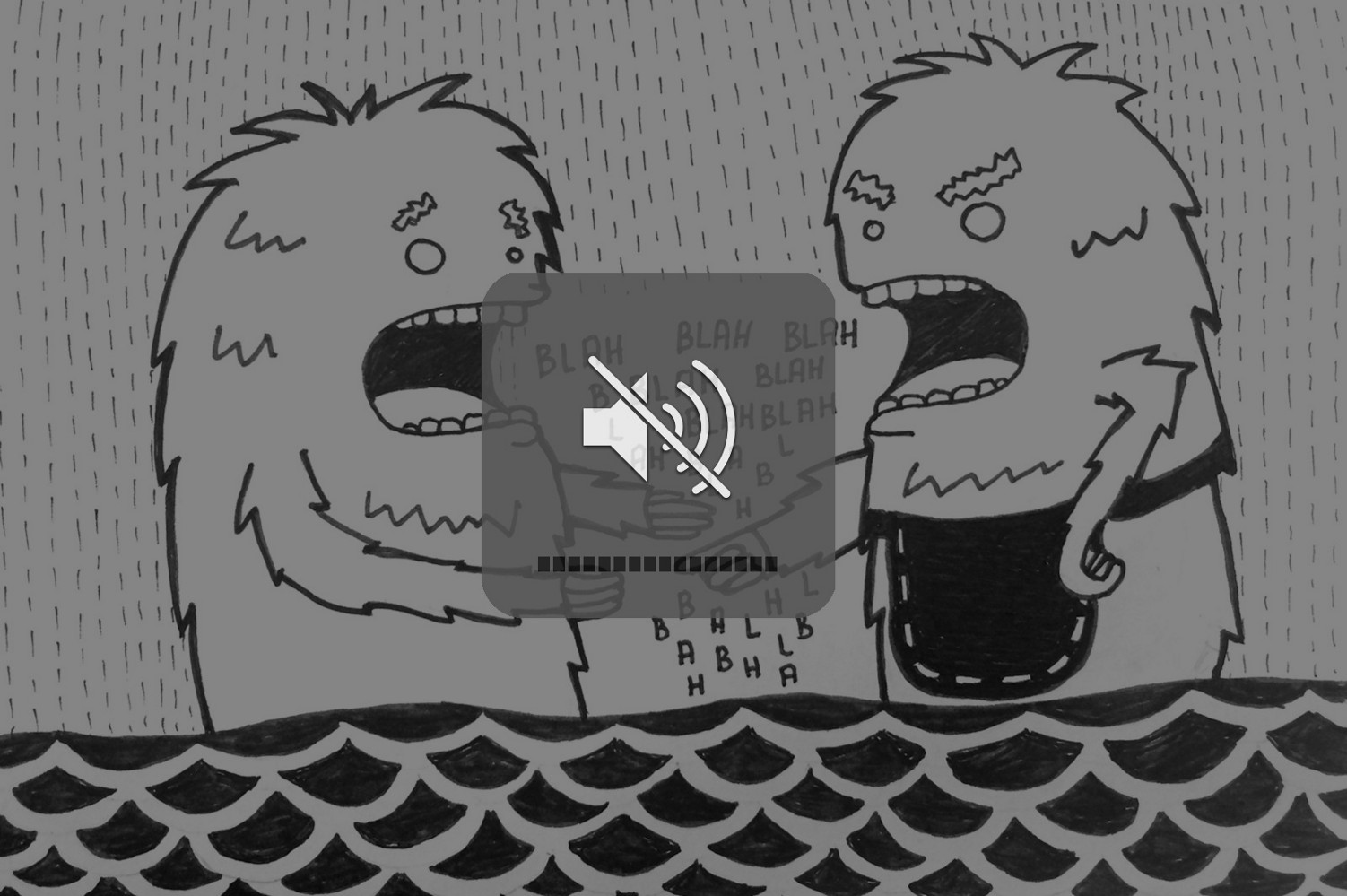Illustrations by Kadriya Khayrutdinova. Edit suggestions by Anne Diebel.

Two little monsters will help me illustrate the point.
Every time, in the heat of arguing, it's in our human nature to do our best to win. However, arguing can get quite irrational when we lose focus on what we're tying to resolve. If we're not focused on solving the problem, we're wasting time and energy that can be diverted into something more positive.
On the bad stage of an argument, our empathy for the other person disappears, and empowers our own self to come through, in a defensive way. We basically turn into angry chihuahuas, cursing sailors or angry cavemen. All that matters is our own view of the problem. Our proposal to resolve it. Our solution. Screw everything else.
But what if we're wrong?
How do we know, if we're too focused onto projecting our reasoning onto the other person?
Some people can't handle this situation.
This sudden spike of adrenaline during an argument has happened before cursing. Right before throwing a plate off the table. Before slamming a door. Before sending an angry email. Before spending money on strange things. Or right before physical aggression.
Losing control of an argument can end in terrifying ways.
Part of my job is to craft seamless paths and smooth transitions between different stages of a user's journey. I need to focus on solving visible problems rather than talking about them.
I need to identify what's preventing a goal to be achieved and build a direct path, without distractions, so it can be reached with less effort. The journey to conquering a problem is tedious enough, so i'd rather have an extremely simple shortcut than a deep and detailed run down of methods and processes to do so.
I try to focus on finding paths in my personal life as well, and specifically in this case, I tried to find a direct path, a shortcut, to resolve conflicts.
To put things in the context of this article: My fiancée is Chinese, I'm Ecuadorian, so the cultural differences do make an impact in our lives. Sometimes these differences are funny. Sometimes they're not.
Here's my recipe.

Step 1: Shut up.
It's such a waste of time to waste energy arguing. Once the discussion reaches the point when you're irrational, there's no way in the world you're gonna end up victorious. Instead, you're gonna end up sleeping on the couch. Eating some ugly microwaveable food. Watching TV till late. Drinking a beer on your own pretending you're reflecting on your brilliance. Slamming doors like an idiot.
Why going through all of this? Just... shut up.
Let the silence embrace your anger. Put a pause to the conflict.
Breathe.
Step 2: Turn around.
I came up with the idea of sitting (or standing) leaning my back against my girlfriend's back whenever a discussion heated up and we needed to resolve a dispute over something.
That's right.

Note how awkward it gets for the monsters.
"Stand, or sit down, leaning your back against the other person's back." -Me, scientist.
Plus, you get a bump in your butt that feels nice.

Step 3: Continue arguing.
That's right. Continue where you left. With the same energy. Just imagine you're still facing the other person, as if nothing had changed, and watch how magic happens.
After a couple of minutes, this always helps to end the discussion. Thanks to this method, we have learned a lot about ourselves and each other. And saved countless moments of angry body language and words bouncing between the walls of our home.
But how?
"What happens is that the arguing immediately becomes more objective." -Me, scientist.
There's no better way to realize if you're right or wrong than speaking with yourself with honesty. Honesty is easily deprived from exposure when we can't control our emotions and interactions.
You no longer have another person across the room to argue with. Instead, you're more vulnerable because your words are aimed to nobody in front of you. You're on your own, looking at a corner of the room. Your voice resonates in the walls and yells back at you. You will hear what the other person in the room hears. It's a wonderful experience.
You will be more clear and objective and think, "Well, I do have a point!" or maybe, "Oh, this is wrong. I am wrong."
For me and my fiancée, it usually takes a few minutes to end the discussion for good. The best part is at the end, when you turn around and you get to face the person that you just agreed with.

Step 4: Turn around again. Enjoy your peace.
This is exceptional with couples. It's a moment of relief and happiness where you go: 'Ah! There she is!' or 'Ah! There he is!' And makes you feel the beauty of a peaceful moment.
This often ends with a silly smirk, a tiny laugh.
Or a slap. Or sex.
Or both. Depends.
Results may vary.
This is a little method that changed how he handled our cultural differences and opinions. Now the tip is out in the wild. Make good use of it!
This post first appeared on Medium.